Table of Contents
Many adults struggle with sleep, with about 30% facing insomnia symptoms. Sleep meditation is a natural way to tackle these issues. Studies show that 70% of those who meditate weekly see big improvements in their sleep. Meditation for sleep offers a complete solution for nighttime restlessness. It uses specific techniques to change sleep patterns and improve overall health. It’s more than just relaxing; it targets the causes of sleep problems with mindfulness and breathing exercises. Science backs up the benefits of sleep meditation. It can cut sleep start time by 10-20 minutes and lower anxiety by up to 50%. People feel more emotionally stable, with 50% feeling calmer before bed. Meditation has been around for thousands of years, starting in ancient India. Today, it’s recognized for boosting sleep quality, even more effective than sleep music. It increases serotonin by 30%, helping with melatonin and natural sleep. This guide will cover different meditation techniques for better sleep. You’ll learn about body scans and guided visualizations. These evidence-based methods can help you sleep more soundly and wake up feeling refreshed.
Quick Picks: Top Tools for Sleep Meditation
[lasso id=”36″ link_id=”378″ type=”table”]
1 Understanding Sleep Meditation and Its Importance
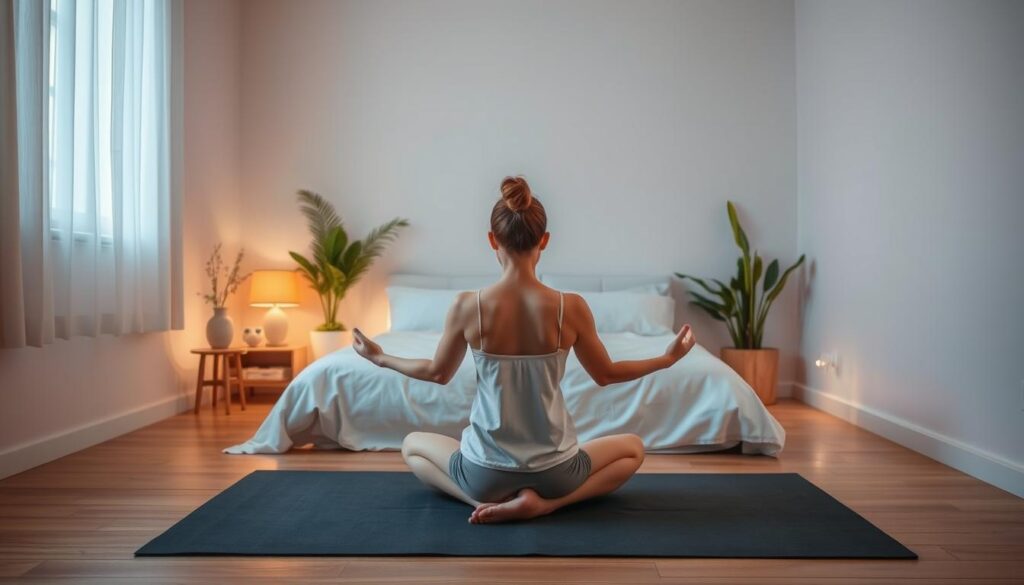 Sleep manifest meditation is a powerful way to improve sleep and mental health. Studies show it can change our sleep patterns and lower stress.
Sleep manifest meditation is a powerful way to improve sleep and mental health. Studies show it can change our sleep patterns and lower stress.
“Meditation is not about stopping thoughts, but recognizing that we are more than our thoughts and our feelings.” – Arianna Huffington
Sleep meditation uses both mental and physical methods to get ready for sleep. It helps calm the mind and release stress from the day.
What Defines Sleep Meditation
Sleep talk meditation is about special practices to:
- Lessen anxiety and mental chatter
- Make a calm mental space
- Help relax deeply
- Make it easier to fall asleep
The Science Behind Meditation and Sleep
Meditation for sleep and love looks at how our mind affects our body. Research shows:
- 62% of people sleep better after meditating
- Mindfulness meditation can make sleep 50% better
- Meditation lowers cortisol levels naturally
How Meditation Affects Brain Waves During Sleep
Studies show meditation changes brain waves. By using certain meditation methods, people can:
- Slow down fast thoughts
- Turn on the parasympathetic nervous system
- Lessen mental activity
Meditation is not a one-size-fits-all solution, but a personalized journey toward better sleep and mental clarity.
2 The Connection Between Quality Sleep and Overall Health

Quality sleep is key to our health, affecting our physical and mental well-being. Studies show that sleep issues affect 10-25% of people. This highlights the need for sleep strategies like abundance sleep meditation, gratitude sleep meditation, and self-love sleep meditation. Sleep does more than just help us rest. It’s when our bodies repair, rejuvenate, and balance hormones. It also strengthens our immune system.
- Repair and rejuvenate tissues
- Consolidate memories
- Regulate hormonal balance
- Support immune system function
“Sleep is the golden chain that binds health and our bodies together.” – Unknown
Studies link sleep quality to overall health. A review of 112 studies found that mindfulness and meditation improve sleep. Self-love sleep meditation can make sleep feel better and reduce daily problems. Research shows that mindfulness and exercise boost sleep. A study found that sleep quality scores improved, with benefits lasting seven months. Adults face sleep issues from 35% to 48%. This shows we all need good sleep strategies. Abundance sleep meditation and gratitude sleep meditation are promising solutions. Investing in your sleep is investing in your overall health and well-being.
3 Types of Meditation for Better Sleep
Sleep problems affect millions in the U.S., with 50 to 70 million people struggling. Meditation offers powerful ways to improve sleep quality. It uses various techniques to help.
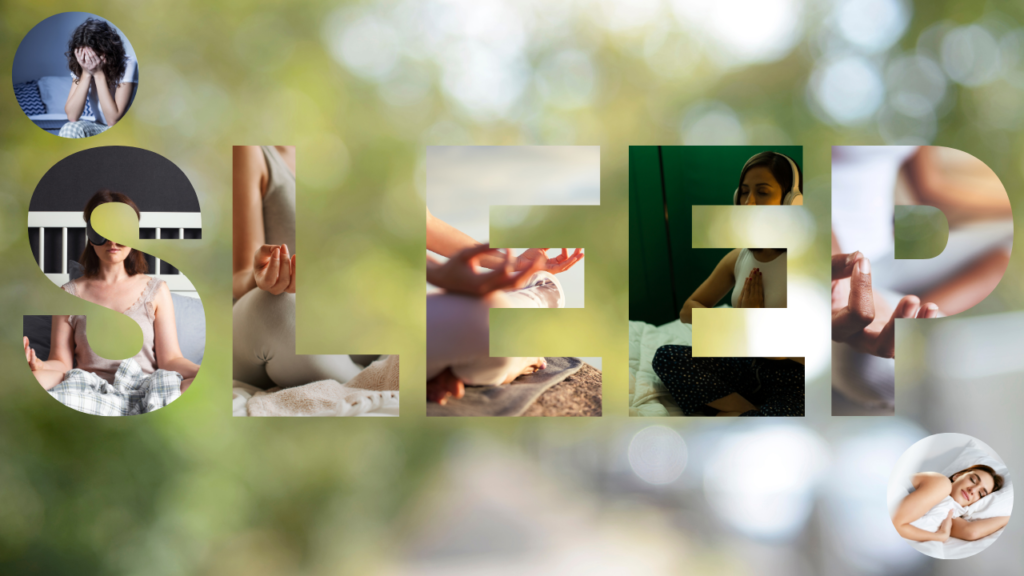
There are different meditation styles for better sleep. They calm the mind and reduce stress. Each style targets specific relaxation and mental preparation for sleep.
Body Scan Meditation
Body scan meditation, also known as Yoga Nidra, is a powerful tool for sleep recovery. It involves relaxing each muscle group. This helps release tension and promotes deep rest.
- Reduces physical tension
- Promotes full-body relaxation
- Assists in stress recovery
[lasso id=”1695″ link_id=”248″ ref=”amzn-yoga-nidra-the-art-of-transformational-sleep”]
Mindfulness Meditation
Mindfulness meditation focuses on being present in the moment. It lets you experience thoughts and emotions without judgment. A 2015 JAMA study showed it can reduce insomnia and fatigue better than other sleep methods.
“Mindfulness is about being fully present in the moment, letting go of accumulated stress and anxiety.”
Guided Visualization Meditation
Visualization meditation uses mental imagery to relax and reduce stress. By imagining peaceful scenes, you can calm your nervous system and prepare for sleep.
Breath Awareness Meditation
Breath-based meditation, like SKY Breath Meditation, can release stress and improve sleep. These practices use controlled breathing to activate the body’s relaxation response. Studies show meditation can lower stress in the brain and cortisol levels. This can lead to better sleep. With 30-50% of adults using meditation for sleep, these methods are a promising alternative.
4 Mindfulness-Based Sleep Practices
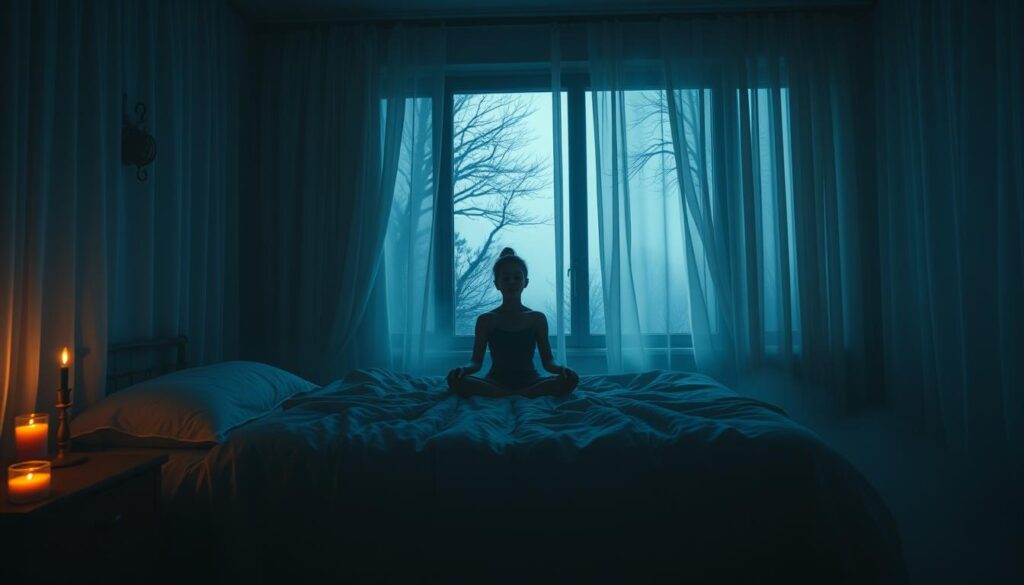 Mindfulness meditation is a strong tool for better sleep. Studies show it’s as good as exercise or therapy for sleep. It helps people relax and feel less anxious about sleep.
Mindfulness meditation is a strong tool for better sleep. Studies show it’s as good as exercise or therapy for sleep. It helps people relax and feel less anxious about sleep.
“Mindfulness is not about perfection, but about paying attention to the present moment with compassion and awareness.”
[lasso id=”1697″ link_id=”249″ ref=”amzn-practicing-mindfulness-75-essential-meditations-to-reduce-stress-improve-mental-health-and-find-peace-in-the-everyday”]
Zen and insight meditation help with sleep issues. They do this by:
- Lowering stress hormones
- Reducing brain activity in stress areas
- Slowing down heart rate and breathing
- Quieting the mind before bed
Science backs up mindfulness for sleep problems. Up to 43% of Americans struggle with sleep due to stress. This makes meditation more important than ever. Here are some mindfulness sleep tips:
- Do a body scan before bed
- Try focused breathing
- Use guided visualization
- Watch your thoughts without judgment
Mindfulness meditation does more than just relax you. It changes how your brain handles stress. This helps you sleep better over time.
5 Guided Meditation Techniques for Better Sleep
Sleep challenges affect millions of Americans. About 60% of adults struggle with sleep. Guided meditation is a natural way to improve sleep and reduce bedtime anxiety.
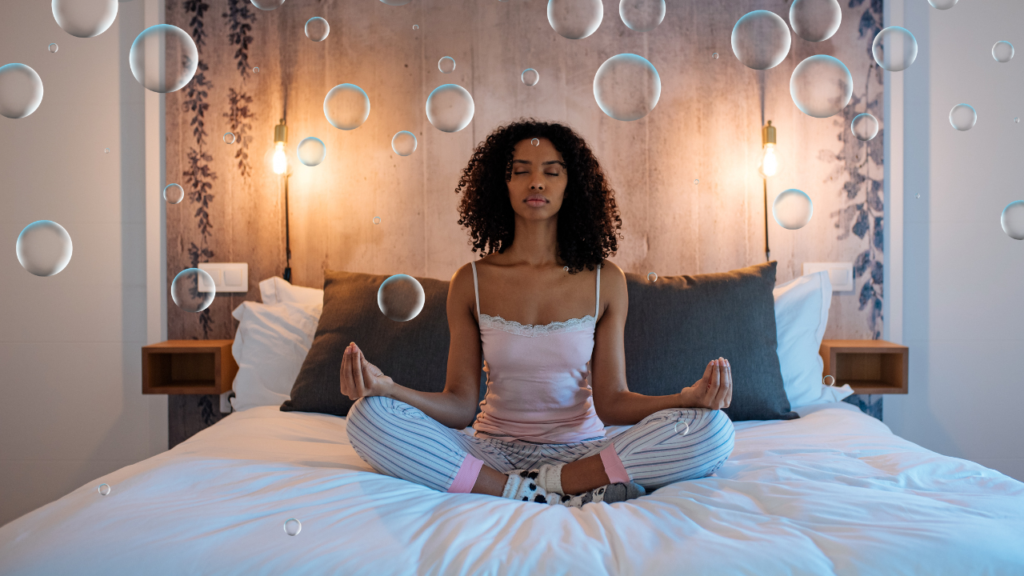
Guided sleep meditation helps you relax and get ready for sleep. Studies show 75% of people who try it sleep better.
Progressive Muscle Relaxation Methods
Progressive muscle relaxation is great for getting ready for sleep. It involves:
- Systematically tensing and relaxing muscle groups
- Reducing physical tension
- Promoting deep relaxation
“Mindfulness practice can transform your sleep experience by calming the mind and releasing physical stress.” – Sleep Research Institute
Visualization Exercises for Sleep
Visualization in guided sleep meditation can stop negative thoughts. It can increase deep sleep by 20%.
Sound-Based Meditation Techniques
Sound bath and binaural beat meditation help you sleep:
- Sound bath meditation: Uses sound to relax you
- Binaural beat meditation: Uses audio to sync brain waves
[lasso id=”1698″ link_id=”250″ ref=”amzn-quantum-theta-waves-binaural-beats-music-for-meditation-deep-relaxation-healing”]
People who try these techniques sleep up to 50% better. The trick is to practice regularly and find what works best for you.
6 Traditional Eastern Meditation Practices for Sleep
Eastern meditation practices are known for improving sleep quality and relaxation. They draw from ancient wisdom to calm the mind and body for restful sleep. 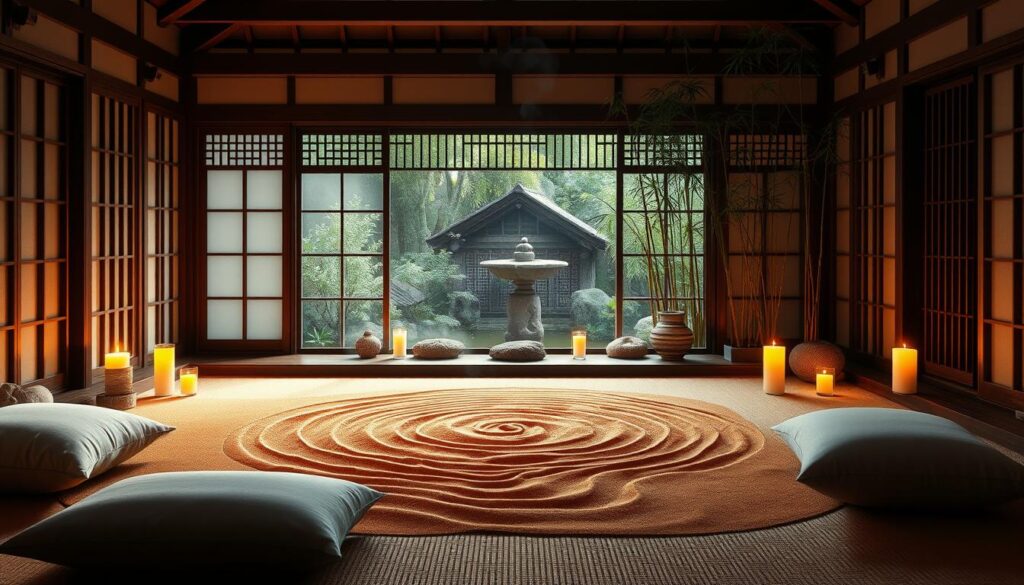
- Zen meditation focuses on breath awareness and mental stillness
- Transcendental meditation uses personalized mantras to achieve deep relaxation
- Kundalini meditation involves energy movement and breath control
- Tibetan singing bowl meditation uses sound vibrations to induce tranquility
“The mind is everything. What you think you become.” – Buddhist Meditation Principle
Qigong, a traditional Chinese practice, combines mental focus with gentle movements. It improves energy flow. Studies show these techniques can reduce stress and improve sleep quality.
| Meditation Practice | Primary Focus | Sleep Benefit |
|---|---|---|
| Zen Meditation | Breath Awareness | Reduces Mental Chatter |
| Transcendental Meditation | Mantra Repetition | Deep Relaxation |
| Kundalini Meditation | Energy Movement | Stress Reduction |
| Tibetan Singing Bowl Meditation | Sound Vibration | Mental Calm |
[lasso id=”1706″ link_id=”252″ ref=”amzn-zen-moon-lamp-visual-meditation-light-for-relaxation-and-mindfulness-guided-breathing-night-light-spiritual-birthday-gifts-for-women-celestial-astrology-decor-for-bedroom-5-5-inch”]
Studies show meditation can cut stress by up to 50% and improve sleep. These ancient techniques help relax the mind for better sleep. More people are using these methods to fight sleep disorders and boost mental health. Eastern meditation offers a complete way to get peaceful, uninterrupted sleep.
7 The Role of Breathing in Sleep Meditation
Breathing is a key to relaxation and better sleep. Breath awareness meditation is a simple yet powerful way to calm the mind and body. Many people have trouble sleeping, with up to a third of adults facing sleep issues at some point.
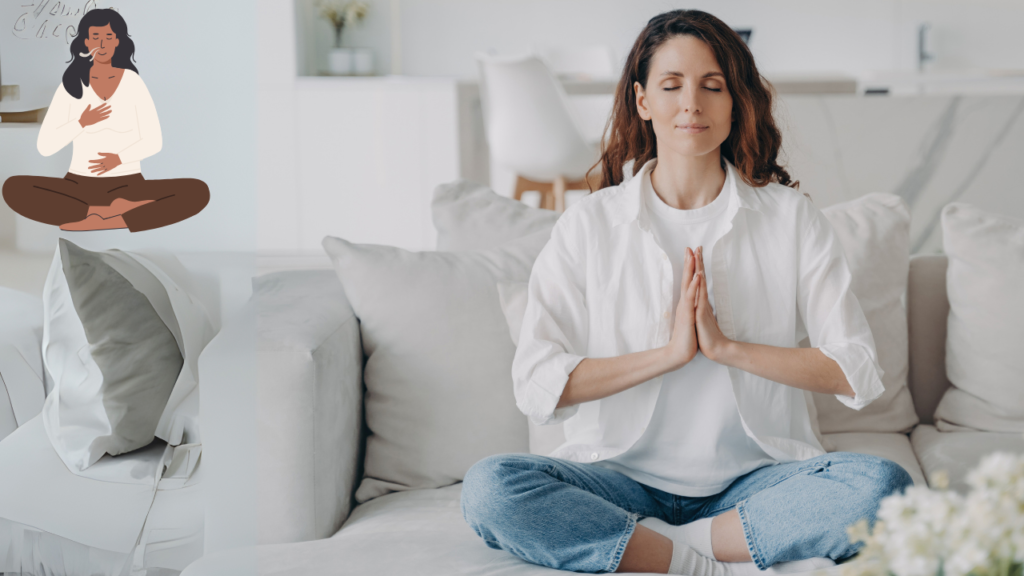
Breath counting meditation helps calm the nervous system. It focuses on the breath to reduce stress and anxiety. These are common barriers to good sleep.
Diaphragmatic Breathing Techniques
Diaphragmatic breathing triggers the body’s natural relaxation response. This method involves:
- Placing one hand on the chest and another on the abdomen
- Breathing deeply through the nose
- Ensuring the abdomen rises more than the chest
- Exhaling slowly through pursed lips
4-7-8 Breathing Method
The 4-7-8 breathing technique is a strong relaxation tool:
- Inhale quietly through the nose for 4 seconds
- Hold the breath for 7 seconds
- Exhale completely through the mouth for 8 seconds
“Breathing is the first act of life, and the last. Our very life depends on it.” – Elizabeth Brown
Box Breathing Practice
Box breathing is a structured way to calm the mind:
- Inhale for 4 seconds
- Hold for 4 seconds
- Exhale for 4 seconds
- Pause for 4 seconds before repeating
[lasso id=”1700″ link_id=”253″ ref=”amzn-mindsight-breathing-buddha-guided-visual-meditation-tool-for-mindfulness-slow-your-breathing-calm-your-mind-for-stress-anxiety-relief-perfect-for-adults-kids-relaxing-self-care-gift”]
Studies show that these breathing techniques can cut sleep onset latency by 10-15 minutes and boost sleep quality. Adding these methods to your bedtime routine can change your sleep for the better and improve your overall health.
8 Yoga Nidra and Deep Relaxation
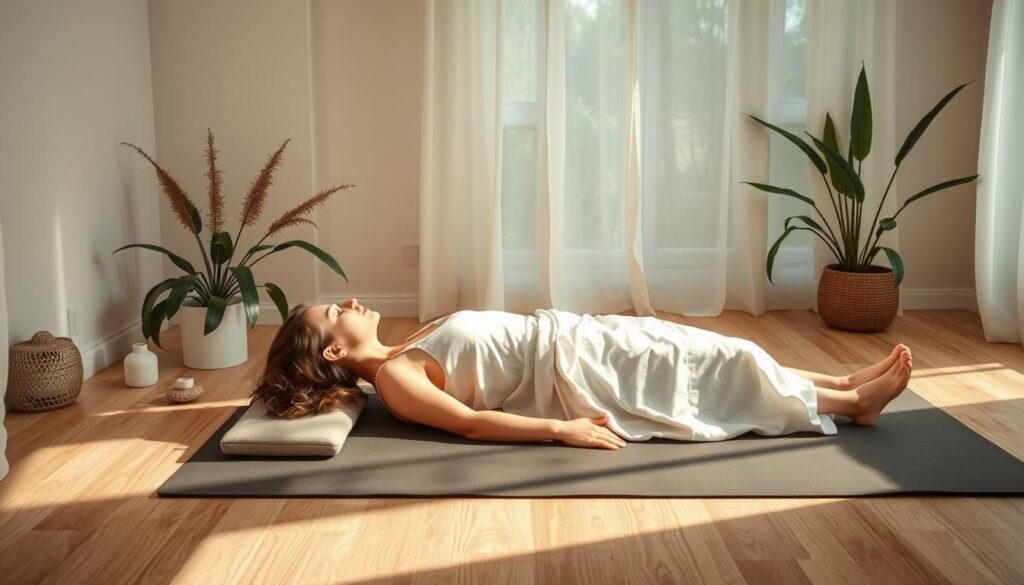 Yoga nidra, also known as yogic sleep, is a powerful meditation technique. It changes how we rest and relax. It comes from ancient Hindu texts from 600 BCE. This practice offers a unique way to meditate deeply and improve sleep. The magic of yoga nidra is its ability to create a state of deep relaxation. A 2022 study showed interesting findings. During yoga nidra, some brain areas stay awake while others sleep.
Yoga nidra, also known as yogic sleep, is a powerful meditation technique. It changes how we rest and relax. It comes from ancient Hindu texts from 600 BCE. This practice offers a unique way to meditate deeply and improve sleep. The magic of yoga nidra is its ability to create a state of deep relaxation. A 2022 study showed interesting findings. During yoga nidra, some brain areas stay awake while others sleep.
“Yoga nidra is not just sleep, but a profound state of conscious relaxation that rejuvenates mind and body.” – Meditation Expert
Benefits of Yoga Nidra
- Reduces stress and anxiety
- Improves sleep quality
- Enhances self-awareness
- Boosts cognitive processing
- Increases overall mental resilience
Reiki meditation for sleep adds to yoga nidra’s benefits. It helps improve sleep patterns. Reiki sleep meditation balances energy and reduces mental chatter.
Practice Insights
- Sessions can range from 5 to 60 minutes
- Typically includes body scan techniques
- Activates parasympathetic nervous system
- Transitions brain waves from beta to alpha/theta states
Research shows yoga nidra can be as restorative as four hours of sleep. By practicing regularly, you can experience deep relaxation and better sleep.
9 Creating the Perfect Environment for Sleep Meditation
To make the best space for sleep chakra guided meditation, think carefully and prepare well. The right setting can make your meditation better and help you sleep deeper. 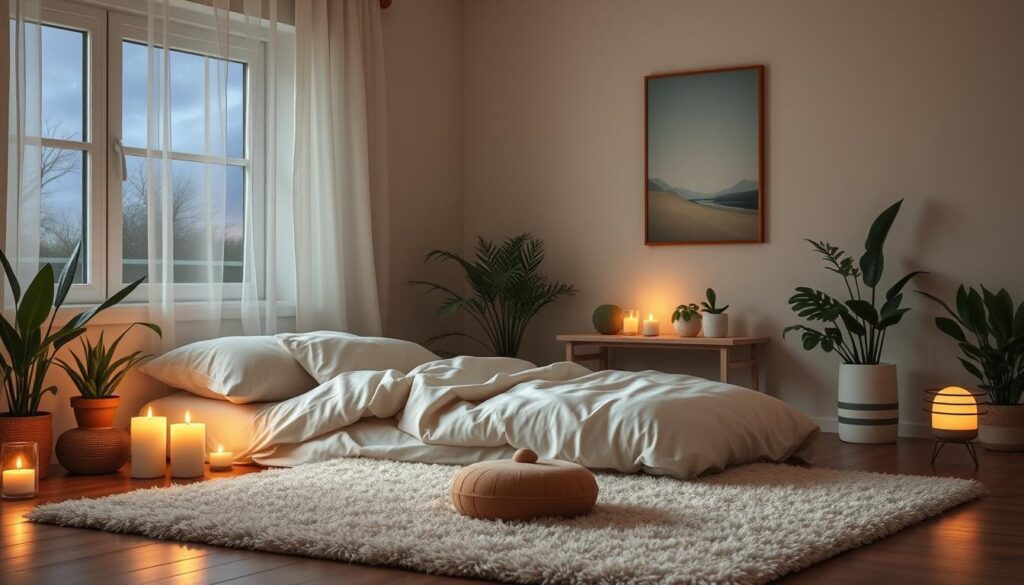 Creating a peaceful meditation area is key. It should support chakra meditation and help you relax. The goal is to make a space that tells your body and mind it’s time to relax and sleep.
Creating a peaceful meditation area is key. It should support chakra meditation and help you relax. The goal is to make a space that tells your body and mind it’s time to relax and sleep.
[lasso id=”1703″ link_id=”256″ ref=”amzn-essential-chakra-meditation-awaken-your-healing-power-with-meditation-and-visualization”]
Essential Space Preparation Techniques
- Choose a quiet, clutter-free area dedicated to chakra guided sleep meditation
- Minimize electronic device interference
- Use soft, dim lighting to create a calming atmosphere
- Maintain a comfortable room temperature between 60-67°F
Optimal Meditation Conditions
Studies show meditation can boost melatonin, helping you sleep. The National Institutes of Health say a quiet space makes meditation better.
| Meditation Environment Factor | Recommended Setting |
|---|---|
| Room Temperature | 60-67°F |
| Lighting | Soft, dimmed |
| Noise Level | Minimal background sounds |
| Comfort | Soft cushions, comfortable clothing |
[lasso id=”1705″ link_id=”257″ ref=”amzn-hihealer-meditation-cushion-traditional-tibetan-meditation-pillow-velvet-cover-large-floor-cushion-seating-for-adults-yoga-buckwheat-bolster-for-women%e3%80%81moms”]
Time Management for Meditation Practice
For regular chakra meditation, pick the right time. Start with 3-5 minutes and grow to 30 minutes. Choose a set time each night for a good sleep routine.
“The quality of your meditation space directly influences the depth of your relaxation and sleep potential.”
By using these tips, you can turn your sleep area into a place for deep relaxation and better sleep through chakra guided meditation.
10 Common Challenges in Sleep Meditation
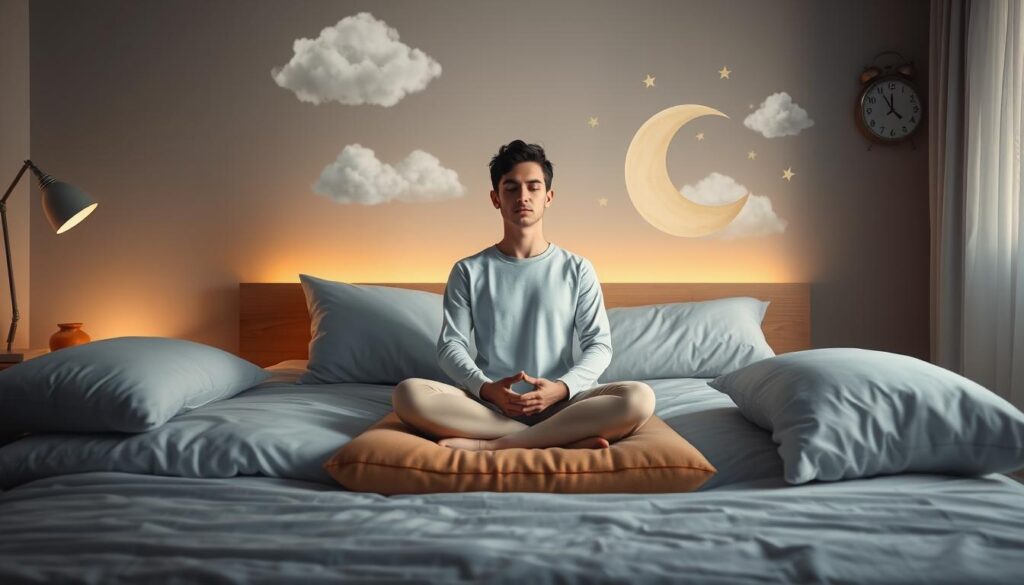 Starting a meditation for sleep and love can be tough. Many people face unique hurdles. It’s important to know these challenges to keep a consistent practice. About 70% of people find their thoughts distracting during meditation. These thoughts can make it hard to relax and sleep well.
Starting a meditation for sleep and love can be tough. Many people face unique hurdles. It’s important to know these challenges to keep a consistent practice. About 70% of people find their thoughts distracting during meditation. These thoughts can make it hard to relax and sleep well.
- Racing thoughts disrupt meditation focus
- Physical discomfort interrupts practice
- Emotional release can be overwhelming
- Overthinking the meditation process
Compassion meditation helps by teaching patience and understanding. Remember, meditation is a skill that takes time to develop.
“Meditation is not about perfection, but about consistent practice and self-compassion.”
Practitioners often struggle with:
| Challenge | Percentage of Practitioners | Potential Solution |
|---|---|---|
| Distracting Thoughts | 70% | Mindfulness techniques |
| Physical Discomfort | 55% | Gentle stretching before meditation |
| Emotional Release | 60% | Accepting emotions without judgment |
Face these challenges with kindness and determination. Remember, 30% of adults struggle with sleep. You’re not alone in this journey.
11 Incorporating Technology in Sleep Meditation
Digital innovations have changed sleep meditation, making relaxation easier to access. Today, 75% of US adults own smartphones that help with meditation. 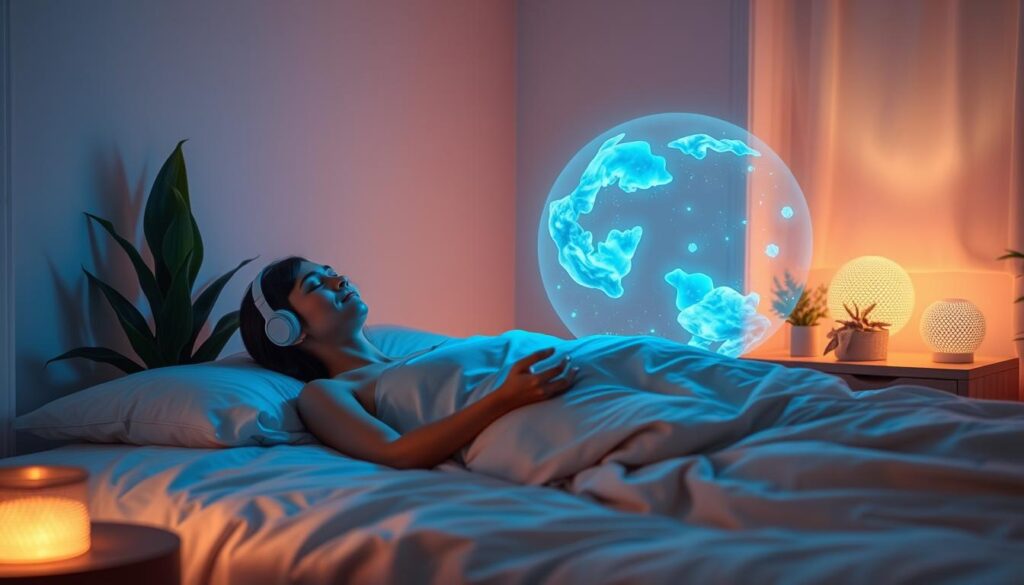 New sleep meditation tools are making a big difference. The pandemic led to a 300% increase in mobile meditation app downloads. This shows more people want digital wellness solutions.
New sleep meditation tools are making a big difference. The pandemic led to a 300% increase in mobile meditation app downloads. This shows more people want digital wellness solutions.
Best Meditation Apps for Sleep
Modern meditation apps have special features for better sleep. They offer:
- Binaural beat meditation
- Self-hypnosis meditation
- Autogenic training recordings
- Personalized relaxation soundscapes
Digital Tools and Resources
Sleep meditation tech offers great benefits. Studies show big improvements in sleep quality:
| Technology Feature | Sleep Improvement Metric |
|---|---|
| Guided Meditation Apps | 40% decrease in sleep onset latency |
| Customized Meditation Programs | 25% improvement in sleep duration |
| Nighttime Meditation Reminders | 65% increased consistency in practice |
Online Guided Sessions
Online platforms offer live and recorded meditation sessions. Approximately 90% of individuals using sleep meditation apps reported improved sleep quality.
Technology has transformed meditation from a complex practice to an accessible, personalized wellness experience.
Experts suggest using sleep meditation tech wisely. They recommend dimming screens, using blue light filters, and keeping volume low. This helps avoid disrupting sleep.
[lasso id=”1659″ link_id=”258″ ref=”amzn-27-28-inch-anti-blue-light-filter-for-computer-monitor-blue-light-monitor-screen-protector-panel-24-8-x-14-6-inch-blocks-blue-light-380-to-495-nm-fits-lcd-tv-and-pc-mac-monitors”]
12 Building a Sustainable Sleep Meditation Routine
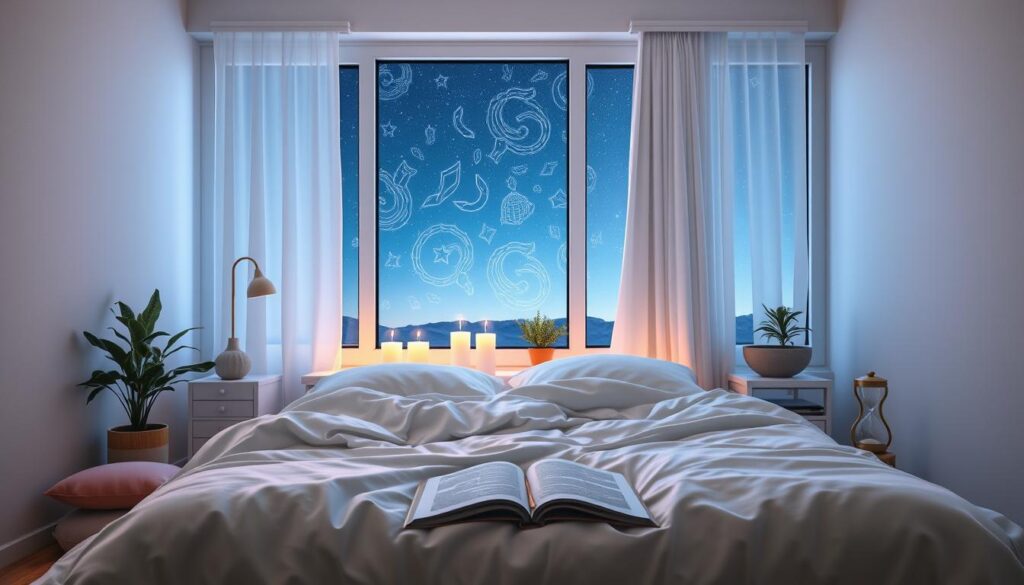 Creating a lasting sleep meditation practice takes patience and a strategic approach. Most adults face sleep issues, with 50 to 70 million dealing with sleep disorders. The goal is to build a consistent, manageable routine that boosts your sleep quality over time. Starting with mindful movement meditation is a great way to begin. Start with short, achievable sessions:
Creating a lasting sleep meditation practice takes patience and a strategic approach. Most adults face sleep issues, with 50 to 70 million dealing with sleep disorders. The goal is to build a consistent, manageable routine that boosts your sleep quality over time. Starting with mindful movement meditation is a great way to begin. Start with short, achievable sessions:
- Begin with 3-5 minutes of meditation before bed
- Gradually increase your practice to 15-20 minutes
- Try different meditation styles, like walking meditation
- Use gratitude meditation to relax your mind
“Consistency is more important than duration in meditation practice”
Studies show meditation can greatly improve sleep. It lowers cortisol, increases melatonin, and boosts relaxation. The Art of Living recommends a 40-day meditation challenge to improve sleep long-term. Tracking your progress is key. Use meditation apps or journals to keep track. Remember, building a sustainable sleep meditation routine is a personal journey of self-discovery and wellness. Here’s a daily commitment to help you:
- Set a consistent meditation time
- Create a calm environment
- Try different meditation techniques
- Be patient with yourself
With regular practice, you can improve your sleep and overall well-being through mindful meditation.
13 Advanced Sleep Meditation Techniques
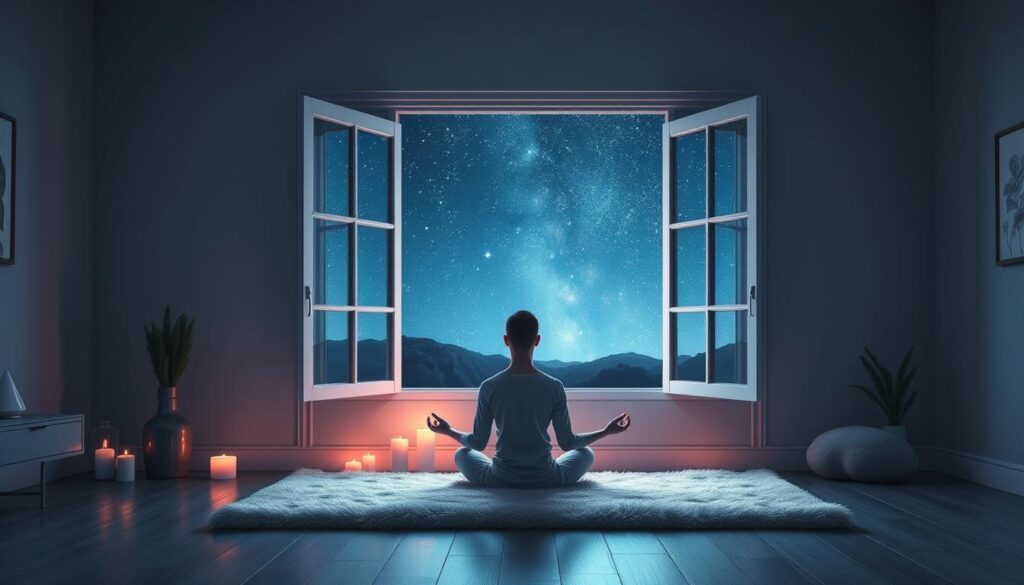 Exploring advanced meditation techniques can change how you sleep. Zen walking meditation, shamanic journey meditation, and white light meditation lead to deep relaxation. They help you get restful sleep. Those looking to improve their meditation can find powerful techniques. These methods reach deeper states of consciousness. They help people overcome sleep challenges more easily.
Exploring advanced meditation techniques can change how you sleep. Zen walking meditation, shamanic journey meditation, and white light meditation lead to deep relaxation. They help you get restful sleep. Those looking to improve their meditation can find powerful techniques. These methods reach deeper states of consciousness. They help people overcome sleep challenges more easily.
- Zen walking meditation combines mindful movement with meditation.
- Shamanic journey meditation connects you with inner healing landscapes.
- White light meditation creates a calming energy field.
[lasso id=”1704″ link_id=”259″ ref=”amzn-the-white-light-meditation-expand-your-consciousness-easy-step-by-step-beginners-guide”]
The SKY Breath Meditation has shown great promise. Millions of people have seen big lifestyle changes. Just 20 minutes of meditation can feel like 8 hours of sleep.
*”Advanced meditation techniques are not about complexity, but about depth of experience.”*
Non-sleep deep rest (NSDR) uses controlled relaxation to boost brain flexibility. Regular practice of these advanced methods can improve your meditation skills. This can greatly enhance your sleep quality. For those with chronic insomnia, affecting about 33% of adults, these techniques offer a way to sleep better. The key is to be patient and keep practicing. Explore deeper meditative states to find restful sleep.
14 Conclusion
Sleep challenges affect millions of adults, with 50% of those aged 55 and older struggling. Meditation is a powerful solution for those with restless nights. Tai chi and qigong meditation offer holistic ways to tackle sleep issues. Mantra meditation helps calm an overactive mind. Research shows meditation’s transformative effect on sleep quality. Studies in JAMA Internal Medicine and the Journal of Sleep Research show big improvements. Participants saw their sleep scores drop from 10.2 to 7.4, showing meditation’s power. Your path to better sleep is unique. You might start with gentle breathing, visualization, or tai chi meditation. The key is to be consistent. Begin with 10-30 minute sessions and build a routine that suits you. Remember, meditation is more than just better sleep. It’s about improving mental and physical health. Start with a mindful breath and see how it changes your life.










